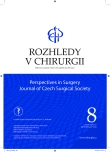Quality of life after proximal gastrectomy − a review
Authors:
P. Lochman; J. Kočí; J. Páral
Authors‘ workplace:
Katedra vojenské chirurgie, Fakulta vojenského zdravotnictví Univerzity obrany, Hradec Králové
; Katedra vojenské chirurgie, Fakulta vojenského zdravotnictví Univerzity obrany, Brno
Published in:
Rozhl. Chir., 2018, roč. 97, č. 8, s. 368-372.
Category:
Review
Overview
Introduction:
The quality of life in cancer patients has received increasing interest recently. The results published to date have shown a potential benefit of proximal gastrectomy compared to total gastrectomy as regards long-term improvement in the quality of life. Up to 70% of gastrectomized patients suffer from various symptoms negatively influencing the postoperative quality of life. These symptoms are collectively referred to as postgastrectomy syndrome. Proximal gastrectomy may be more beneficial as opposed to total gastrectomy since it preserves a functional part of the stomach and allows alleviation of these symptoms. Numerous questionnaires are used to evaluate the quality of life in gastric cancer patients. The PGSAS-45 questionnaire of the Japanese Postgastrectomy Syndrome Working Party is probably the best validated one. Results of works published to date evaluating the quality of life after proximal gastrectomy are summarized in the text and an overview of basic evaluated parameters is presented.
Conclusion:
The works published so far related to quality of life after proximal gastrectomy have described outcomes only in patients with early gastric cancers or in cT2N0 patients. Further studies with more patients involved, comparison between every single modification of proximal gastrectomy and also inclusion of advanced stages will be necessary to determine the optimal type of surgery. Nevertheless, the majority of studies published to date favor proximal gastrectomy against total gastrectomy in terms of better postoperative quality of life.
Key words:
gastric cancer − esophagogastric junction cancer − quality of life − proximal gastrectomy
Sources
1. Karanicolas PJ, Graham D, Gönen M, et al. Quality of life after gastrectomy for adenocarcinoma: a prospective cohort study. Ann Surg 2013;257 : 1039−46.
2. Aaronson NK, Ahmedzai S, Bergman B, et al. The European Organization for Research and Treatment of Cancer QLQ-C30: a quality-of-life instrument for use in international clinical trials in oncology. J Natl Cancer I 1993;85 : 365−76.
3. Vickery CW, Blazeby JM, Conroy T, et al. Development of an EORTC disease-specific quality of life module for use in patients with gastric cancer. Eur J Cancer 2001;37 : 966−71.
4. Svedlund J, Sjodin I, Dovetall G. GSRS – a clinical rating scale for gastrointestinal symptoms in patients with irritable bowel syndrome and peptic ulcer disease. Digest Dis Sci 1988;33 : 129−34.
5. Nakamura M, Kido Y, Yano M, et al. Reliability and validity of a new scale to assess postoperative dysfunction after resection of upper gastrointestinal carcinoma. Surg Today 2005;35 : 535−42.
6. Nakada K, Ikeda M, Takahashi M, et al. Characteristics and clinical relevance of postgastrectomy syndrome assessment scale (PGSAS)-45: newly developed integrated questionnaires for assessment of living status and quality of life in postgastrectomy patients. Gastric Cancer 2015;18 : 147−58.
7. Shan B, Shan L, Morris D, et al. Systematic review on quality of life outcomes after gastrectomy for gastric carcinoma. J Gastrointest Oncol 2015;6 : 544−60.
8. Shiraishi N, Adachi Y, Kitano S, et al. Clinical outcome of proximal versus total gastrectomy for proximal gastric cancer. World J Surg 2002;26 : 1150−4.
9. Adachi Y, Suematsu T, Shiraishi N, et al. Quality of life after laparoscopy-assisted Billroth I gastrectomy. Ann Surg 1999;229 : 49−54.
10. Tokunaga M, Hiki N, Ohyama S, et al. Effects of reconstruction methods on a patient´s quality of life after a proximal gastrectomy: subjective symptoms evaluation using questionnaire survey. Langenbeck Arch Surg 2009;394 : 637−41.
11. Nunobe S, Sasako M, Saka M, et al. Symptom evaluation of long-term postoperative outcomes after pylorus-preserving gastrectomy for early gastric cancer. Gastric Cancer 2005;10 : 167−72.
12. Namikawa T, Oki T, Kitagawa H, et al. Impact of jejunal pouch interposition reconstruction after proximal gastrectomy for early gastric cancer on quality of life: short - and long-term consequences. Am J Surg 2012;204 : 203−9.
13. Inada T, Yoshida M, Ikeda M, et al. Evaluation of QOL after proximal gastrectomy using a newly developed assessment scale (PGSAS-45). World J Surg 2014;38 : 3152−62.
14. Takiguchi N, Takahashi M, Ikeda M, et al. Long-term quality-of-life comparison of total gastrectomy and proximal gastrectomy by postgastrectomy syndrome assessment scale (PGSAS-45): a nationwide multi-institutional study. Gastric Cancer 2015;18 : 407−16.
15. Nishigori T, Okabe H, Tsunoda S, et al. Superiority of laparoscopic proximal gastrectomy with hand-sewn esophagogastrostomy over total gastrectomy in improving postoperative body weight loss and quality of life. Surg Endosc. Published online 2017. Available from: doi:10.1007/s00464-016-5403-y
Labels
Surgery Orthopaedics Trauma surgeryArticle was published in
Perspectives in Surgery

2018 Issue 8
- Possibilities of Using Metamizole in the Treatment of Acute Primary Headaches
- Metamizole at a Glance and in Practice – Effective Non-Opioid Analgesic for All Ages
- Metamizole vs. Tramadol in Postoperative Analgesia
-
All articles in this issue
- Radicality of proximal gastrectomy – a rewiev
- Quality of life after proximal gastrectomy − a review
- Can the One-Step Nucleic Acid Amplification method of lymph nodes examination make the staging of pulmonary tumours more precise?
- Pleural empyema – single center experience
- Risk factors and post-operative complications after gastrectomy for cancer
- Liver Tuberculosis − a case report
- Inverted Meckel´s diverticulum: a rare cause of ileo-ileal intussusceptions and lower gastrointestinal bleeding
- Perspectives in Surgery
- Journal archive
- Current issue
- About the journal
Most read in this issue
- Risk factors and post-operative complications after gastrectomy for cancer
- Radicality of proximal gastrectomy – a rewiev
- Quality of life after proximal gastrectomy − a review
- Liver Tuberculosis − a case report
